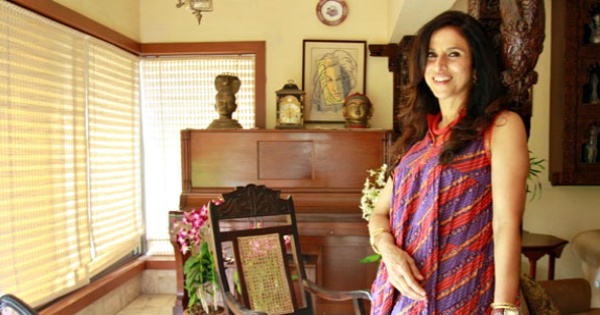Is Shobhaa De Anti-Hindu? An Analysis
 I have been reading Shobhaa De’s work for years. Having tried to slot her in a political category, I can now say she is an original thinker. She is neither left nor right, and this sets her apart from other journos. However, her writerly identity is strange. She retweeted Meena Kandasamy’s anti-Hindu post, and had written a glorifying piece on Nita Ambani as well as calling her home Antilia the “Taj Mahal of the 21st century.” De is no pauper or stranger to controversy. Married to a Bengali businessman, she has a big family, and posts visuals of her life on Instagram. This granny has a gun—a pen that shoots bullets and does not dry out.
I have been reading Shobhaa De’s work for years. Having tried to slot her in a political category, I can now say she is an original thinker. She is neither left nor right, and this sets her apart from other journos. However, her writerly identity is strange. She retweeted Meena Kandasamy’s anti-Hindu post, and had written a glorifying piece on Nita Ambani as well as calling her home Antilia the “Taj Mahal of the 21st century.” De is no pauper or stranger to controversy. Married to a Bengali businessman, she has a big family, and posts visuals of her life on Instagram. This granny has a gun—a pen that shoots bullets and does not dry out.
But I am not scared of Shobhaa De. I want her to shoot me. As I penned a poorly written early obituary of her when I was a student at the School of Oriental and African Studies in London (forgive me!). Luckily, she did not respond to my obit in the email in which I included it. I was happy! I am also happy to see a desi author, who balances between left-wing extremism (in Sultry Days her protagonist says, “I didn’t mind being called a capitalist pig”) and a kind of right-liberal perspective that is open to criticism (in NDTV.com she writes, “I am as staunchly Bharatiya as my next door neighbour who is celebrating Eid today”). De’s is a unique voice. She is outspoken, brave, and has written many bodice-rippers. While she has been called the “Jackie Collins of India” for good reason, she is a complex figure—her liberalism needs explanation, and her words even more.
I enjoy reading De, though I find her Hinglish cumbersome. I cracked up as I read her obit of Khushwant Singh in the Mumbai Mirror. The first line was “Let’s be honest: Khushwant Singh was not a handsome man” and her article on Raghuram Rajan where her first line was “The guy’s put ‘sex’ back into the limp Sensex.” Ha ha! I prefer De to Naipaul. Naipaul did not write funny first lines. He was, as she writes, “a studied act”. De has transformed Indian English into a Mumbai brothel where each line cajoles, kisses, and hugs ideas that crusade against the obstreperous activism of the far left while being judgemental about the cultural chauvinism of the far right. She tweeted in 2018: “Why such a thundering silence over a nun’s rape? Even the Pope has intervened. But most of our ever ready causewallas are mum. No placards. No hashtags. No outrage.” Although as a centre-right individual who has understood that speaking up for Bharat can get one into trouble, I admit to my predicament—I am also neither here nor there (but only sometimes, ma!). However, some Hindus love Naipaul as much as I love De. The two have left an indelible mark in the world of literature, offering readers an escape from everyday ho-hum to the magic and mystery of the written word.
De now writes for The Week, The Times of India, Deccan Chronicle, and The Asian Age. Her best article is in Upper Crust where this one line is enrapturing: “I can recall cities on my tongue.” When I was studying at an extremist Malayali Catholic college in Bengaluru more than a decade ago, I read her autobiography; it resonated with me, and gave me a tingling feeling—I was not alone in trying to express a liberal opinion that rose from being knowledgeable about what was happening in the world. De gave me a lens through which I could see things in the reading sound. Her columns have that masala that propels readers to opine, and she does so by starting with a witty line.
As a 32-year-old man, I am Mrs De’s fan. But as a devotee of a self-realised Master, I disagree with her on a couple of topics. Her take on Hindu Gurus—whom she calls “godmen” and “godwomen”—reveals her scepticism. She simply does not get the fact that there are genuine Gurus. To her Sathya Sai Baba would be a fraud; when He was not. Maybe she has never met a real Master. Sri Sri is not an avatar—so her piece on him is fully accurate, but if you have met just a few people, how will you be able to experience the transcendental? Here is the skinny: Her daughter is a Sri Sri devotee. I wonder what both talk about! As far as her public pronouncements on Gurus are concerned, she appears averse to them, and tars them with the same brush. Has she met Amma? Sai Baba? Nope! Alas, this is the state of journalism today when it comes to our Masters. But no hard feelings for De. She can be excused as her clever, elegant writing overwrites some of her opinions, and for that reason alone, it bears critical analysis.
De is a beef-eating Hindu, and her tweet suggests she is a proud Gaud Saraswat Brahmin. This would make Ambedkarite S Anand angry, as he levelled casteist allegations against Rajdeep Sardesai, Ashis Nandy, Girish Karnad, U R Ananthamurthy, Ramachandra Guha, and Indra Nooyi in his diatribe. De could be added to the list. What is interesting about her is her carefully balanced views on current and past governments, conveying them cattily and adroitly, sticking to her sense of self—that of a quasi-fence-sitter—and employing her disturbingly eloquent commentaries that pack a punch to her advantage. While she endorsed Rahul Gandhi in 2018, she now thinks Modi has “a phenomenal brain”.
So is she anti-Hindu? She is at some level, but on another, she is not. She wishes her social media audience on Hindu festivals. She acknowledges being Hindu, while debunking the misplaced version of Hinduism of the Dinanath Batra-types, which every religion has. Her stance on the Ayodhya verdict was nonpareil; she wished readers “Jai Shri Ram!”. Like many Hindus, she calls Hinduism “a way of life”. Although she is not a Hindutva toady, she constructs a pro-India (rather than pro-Hindu) argument after meticulous research, leading to a concoction of multiple views brought together in a manner where she does not have to take a strong stance. Her ideas work into prose that is dovetailed to suit the imagination of readers who respect her for what she is, and what she has been called by both trolls and admirers.
However, she needs to meet a self-realised Master like Amma to understand what India’s gift to the world, Hindu spirituality, is all about. She sees an unholy alliance between “God Guys” and politicians. There is some truth to it. Jaggi Vasudev and Sri Sri are no “Sadhgurus”. They may be yoga gurus, but they are definitely not equal to Masters like Shirdi Sai Baba and Sri M. De needs to explore ashrams run by genuine leaders, and then comment on issues about them. I can understand why she is a sceptic, as there are many frauds out there, but saying our Masters exploit “vulnerabilities” is to do injustice to the dharmic cause. Yes, the frauds exploit vulnerabilities and give Hinduism a bad name. That does not mean the good ones are dirty too!
Shobhaa De’s work needs to be situated in the context in which events operate. She soaks in all relevant information before keying in her work which has the power to shape public opinion. She is a good writer; her articles deliver the promise of staying true to the ideas of democratic Bharat. But she needs to understand that Hinduism’s plurality is woven into its warp and woof, and that has happened because of the teachings of our innumerable Masters. As I watch the Surya tilak on Ram Lalla’s forehead with wide-eyed wonder, I ask: What would Shobhaa De write on this moment in Hindu history? Would she write a bhakti-laden piece? Or slip in a line about Rama in her inimitable way? God knows.
Dhruv Ramnath
Latest posts by Dhruv Ramnath (see all)
- Is Shobhaa De Anti-Hindu? An Analysis - July 27, 2024






